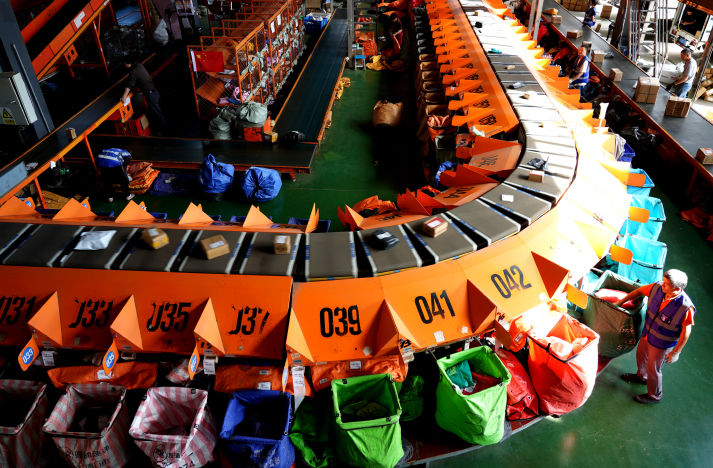| Business |
| Annual shopping festival reveals new frontiers for consumption growth | |
|
|
 Staff sort packages at a courier sorting center in Yueqing, Zhejiang Province, on November 11 (XINHUA)
Since its inception in 2009, the annual Double 11 shopping festival in China, initially taking place on November 11, has grown into a phenomenon, now entering its 16th year. Rewind to its first few years, when e-commerce was still in its infancy, issues like logistics congestion and payment system failures were the most pressing challenges—problems that, though they seem like a distant memory now, were the very heartbeat of the e-commerce ecosystem at the time. Double 11 has served as a kind of proving ground. Each year, it puts China's e-commerce system through its paces, pushing the limits and refining the infrastructure. This year's Double 11 was the longest in history. What started as a one-day promotional event of e-commerce giant Alibaba Group this time around stretched into a month-long shopping extravaganza across all Chinese e-commerce platforms culminating on November 11. Over the past 16 years, the nature of Double 11 consumption has also transformed from an intense, flash sale-style shopping spree into a fun, laid-back experience. Double discount Li Qile, a resident of Hangzhou, Zhejiang Province, had long been considering replacing his old TV with a new smart model. When he learned that this year's Double 11 would include government-backed trade-in subsidies for household appliances, he abandoned his hesitation and swiftly placed his order. "The TV was originally priced at 4,599 yuan ($635), but with a government subsidy of nearly 700 yuan ($96), plus additional discounts from coupons offered by [Alibaba's business-to-consumer platform] Tmall, I paid just 2,799 yuan ($386)," Li told Beijing Review. "The savings were substantial, making it a deal too good to pass up." After hearing about the price Li paid, his mother decided to upgrade several household appliances as well. Originally planning to buy just a refrigerator, she ended up purchasing six different products. She was able to take advantage of multiple discounts from the government, the brick-and-mortar mall, and the brands themselves. "The original price of the six appliances totaled 58,650 yuan ($8,098), but with vendor and brand subsidies of 8,500 yuan, plus a government rebate of 10,030 yuan, the final price came to just 40,120 yuan ($5,540)," Li explained. This year's Double 11 received a strong boost from the government's new pro-consumption policies. In July, the central authorities announced plans to allocate around 300 billion yuan ($42 billion) in long-term special treasury bonds to support large-scale equipment upgrades and consumer goods trade-ins. Local governments have also been rolling out measures to add strength to the trade-in initiative. A new round of the household appliance trade-in program officially kicked off in August. The policy, known as Eight Plus N, specifies that consumers purchasing eight types of energy-efficient appliances—refrigerators, washing machines, TVs, air conditioners, computers, water heaters, kitchen stoves and range hoods—will receive subsidies ranging from 15 percent to 20 percent of the product price, with a maximum subsidy of 2,000 yuan ($276) for each category. In other words, purchases in all eight categories could qualify for a total subsidy of up to 16,000 yuan ($2,208). Major e-commerce platforms have quickly jumped on board with the trade-in initiative by handing out generous subsidies. Take Tmall for example. In partnership with numerous brands, it has offered 6 billion yuan ($828 million) in vouchers and brand-specific discounts to consumers. This initiative drove a massive surge in Double 11 household appliances sales, with the first hour of pre-sale (8 p.m.-9 p.m. on October 14) alone seeing a 765-percent year-on-year increase in transactions on Tmall compared to the same period of last year's festival. By the fourth hour, the sales figures of 471 home appliance brands had already doubled. "The trade-in policy benefits a broad range of consumers, particularly middle- and low-income households," Hong Yong, an associate researcher at the E-Commerce Institute of the Chinese Academy of International Trade and Economic Cooperation, told Beijing Review. "By lowering the cost of purchases, more households can enjoy the convenience and comfort brought about by new technologies." He said China already has a substantial stockpile of consumer goods and equipment available for recycling, which has the potential to translate into a promising market for new products and technologies. This also presents enormous opportunities for the circular economy and will drive innovation across the entire recycling and utilization chain.  A consumer (right) explores television products at a JD.com super experience store in Jiangbei District, Chongqing Municipality, on October 17 (XINHUA)
Breaking boundaries One of the standout features of this year's Double 11 was the broader connectivity it offered. Since September, Alibaba's consumer-to-consumer marketplace Taobao has once again allowed consumers to place orders directly from a Taobao link shared via social media giant Tencent's super app WeChat, without having to switch back to the Taobao app. Meanwhile, it has also begun accepting payments through Tencent's digital wallet service WeChat Pay. On October 16, e-commerce platform JD.com's logistics arm JDL announced that it would work with Taobao and Tmall, allowing vendors on the two platforms to choose JDL as their delivery service provider. According to an agreement between JD.com and Alibaba's logistics brand Cainiao, third-party merchants on JD.com can now use courier services by Cainiao Express and Cainiao's large-item delivery services. The companies' recent reopening to each other following years of efforts to develop their exclusive e-commerce ecosystems has been applauded by both industry insiders and their users. The collaboration is expected to open up new possibilities for the e-commerce industry. According to a report by big data intelligence service provider QuestMobile, with Taobao announcing acceptance of WeChat Pay for payments, it's expected that Taobao's monthly active users will surpass 1 billion for the first time next year. Hong said the interoperability between platforms in payment and logistics will provide online retailers and consumers with more service options, reduce their operational costs, and enhance the overall consumer experience. Furthermore, broader connectivity also signifies a further-reaching global presence. Recently, Taobao and Tmall's overseas free shipping service extended its coverage to include Singapore, Malaysia, Thailand, Japan, the Republic of Korea, Viet Nam and Cambodia. Consumers in these countries can now enjoy free shipping on orders over a certain value, with products spanning categories including fashion, electronics, baby products, toys, sports and outdoor gear, home goods, and appliances. At the same time, JD.com has added Malaysia and Thailand as new free shipping destinations. Data from Taobao and Tmall reveal that nearly 70,000 retailers participating in their global free shipping program reported a doubling of sales in the early days of this year's Double 11. Hong said the introduction of overseas free shipping services by Chinese e-commerce platforms reflects the major improvements in the country's e-commerce capabilities, particularly in global operations, logistics infrastructure and payment solutions. He added that the popularity of China-made products in overseas markets can largely be attributed to their superior cost-performance ratio, which is driven by China's mature and efficient supply chain. Additionally, the vast size of international markets and their relatively low e-commerce penetration present huge opportunities for domestic brands to expand their businesses. (Print Edition: More Than Just a Day) Copyedited by G.P. Wilson Comments to zhangshsh@cicgamericas.com |
|
||||||||||||||||||||||||||||
|